Political Philosophy and Taxation: A History from the Enlightenment to the Present » książka
topmenu
Political Philosophy and Taxation: A History from the Enlightenment to the Present
ISBN-13: 9789811910913 / Angielski / Twarda / 2022
Political Philosophy and Taxation: A History from the Enlightenment to the Present
ISBN-13: 9789811910913 / Angielski / Twarda / 2022
cena 605,23
(netto: 576,41 VAT: 5%)
Najniższa cena z 30 dni: 539,74
(netto: 576,41 VAT: 5%)
Najniższa cena z 30 dni: 539,74
Termin realizacji zamówienia:
ok. 22 dni roboczych
Bez gwarancji dostawy przed świętami
ok. 22 dni roboczych
Bez gwarancji dostawy przed świętami
Darmowa dostawa!
This book explores how taxation is related to the role of the state and its relationship with its constituents, the concept of private property rights, the concepts of societal fairness and justice, and the battle between the individual and the collective. This book appeals to students and scholars who want to know how philosophers in the past and present think about taxation, and how their thinking has developed through cross-influencing. There exists no comprehensive study providing such an overview. This book is a foundational study on the philosophical justification of taxation (qualitative aspect) and the normative qualifications required of tax law to constitute tax that is just and fair (distributive or quantitative aspect). The latter includes evaluation of what type of tax is morally correct or acceptable to realize distributive justice. This book covers periods from the Enlightenment era until the present. The philosophers are grouped together in schools of thought and each chapter except for chapter 1 and chapter 13, are is dedicated to a specific philosophical school. Moreover, this book aims to provide an overview of each school of thinking and the individual philosophers, including placing them in the context of their times. The book has particular importance as the study of taxation is an underdeveloped area of political and legal philosophy.











